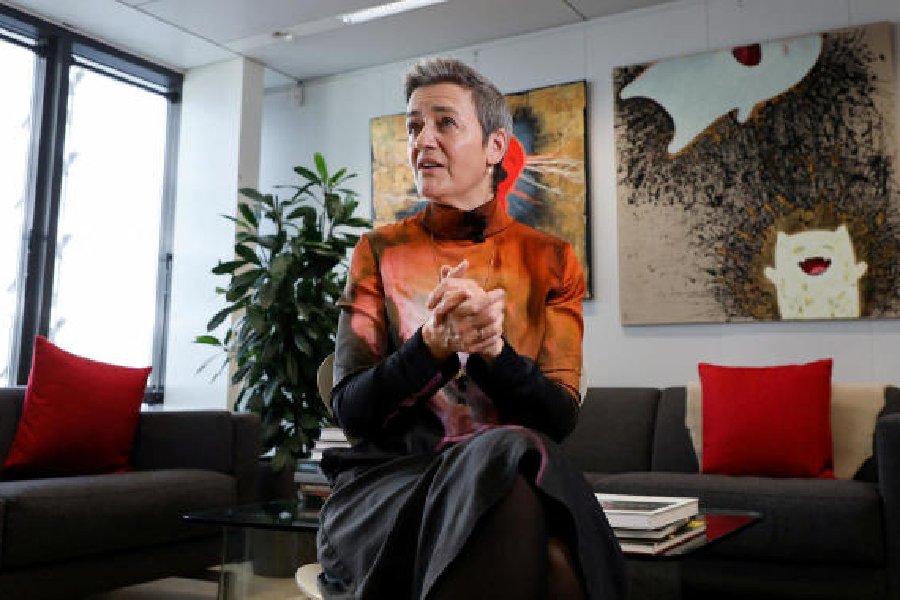Margrethe Vestager, the EU antitrust enforcer who has been the world’s foremost critic of the tech industry, recently walked through her Brussels office wondering what to do with the stuff she had accumulated during a decade in that role, which ends late this month. At one point, she paused to lift a sculpture of a hand holding up its middle finger.
“What should I do with this?” Vestager, 56, asked. The middle finger, she has said, was a reminder not to let critics get you down.
Vestager, a Danish politician who was the rare EU official to become known globally, has faced plenty of detractors over the years. When she was appointed to police antitrust in 2014, she became one of the first government officials in the world to aggressively bring cases and fines against Google, Apple and Amazon for conducting illegal business practices and trying to block competition.
At the time, the US digital titans were growing quickly and were highly popular for their innovations. Vestager grappled with backlash for her actions, with tech leaders saying she was stymieing Europe’s economy by scaring off start-ups from building in the region. In 2018, President Donald J. Trump reportedly said she “really hates” America.
But as Vestager closes out her era in Brussels, regulating the tech industry has become more mainstream around the world. Thanks to her, Europe is now widely seen as the pioneer of the toughest laws against tech. US regulators have in recent years followed Europe by bringing antitrust lawsuits against Google, Apple, Meta and Amazon. Regulators in South Korea, Australia, Brazil, Canada and elsewhere are also taking on the tech giants.
“It is extremely satisfying,” Vestager told The New York Times, adding that she cried when the EU’s highest court gave her an unexpected victory in August in a protracted tax-avoidance case against Apple. “People thought that we were crazy because 10 years ago, Big Tech was untouchable. They were the most admired, the most innovative, the most promising companies that you could think of.”
Even in Washington, Vestager has gone from outcast to trailblazer. In September, when she made a final visit to her counterparts at the US justice department, staff members there packed a room to hear her speak and gave her a standing ovation as she exited.
“She is a transformational figure,” said Jonathan Kanter, the head of the department’s antitrust division, who has a framed picture in his office of a cartoon mouse giving the middle finger as a homage to Vestager. “She came into office at a time when not a lot of people were talking about the importance of strong oversight of digital gatekeepers. Because of her, it’s an important and relevant topic of conversation.”
Vestager is now preparing to take a role at a university in Denmark. Teresa Ribera Rodríguez, a Spanish official, is set to take over as the EU’s top antitrust regulator.
Vestager recently discussed Trump’s victory and its implications, her confidence that Europe will continue to lead in policing the tech industry and why restricting certain forms of speech online is totally acceptable — even if it draws the ire of Elon Musk. Here are excerpts.
Vestager said she was proud of her record, but acknowledged challenges.
Many techies have criticised Vestager’s tough approach, saying she harmed Europe’s tech industry and enlarged its reputation as a creator of bureaucratic rules.
But some former colleagues said the region’s regulations did not go far enough. Google, Apple, Amazon and others have grown even more powerful over the past decade.
“Have we moved the dial and changed the system? Only at the margins,” said Tommaso Valletti, who was a top economist under Vestager and praised her commitment to the issue in the face of adversity. “Did we change Big Tech? My answer is no.”
Vestager said that she was proud of her tenure, but that it had been only “partly successful”. She said that she wished her office could have moved faster and that she had pushed for companies to make tougher structural changes in addition to issuing fines. She urged regulators everywhere to be “bolder”.
Vestager said that collaboration was very strong with US regulators, but that it could change under Trump.
Until recently, the US was known for its hands-off oversight of the tech industry. Vestager praised the Biden administration’s more aggressive approach, which has included overseeing antitrust trials against Google. In one case, the justice department is pushing for a break-up of the Internet giant.
For a US regulator to take such a major step would have ripple effects globally and could change industry behaviour, Vestager said.
“We are in the business of deterrence,” she said. “And if we do not once in a while use our most powerful tools, there’s no deterrence.”
Vestager said it was “very difficult to say” how things would change under Trump, but she noted how quickly tech leaders had congratulated him on his election. “When you saw how fast tech leaders congratulated President-elect Trump, you see that there was a strong hope that this will all change,” she said.











